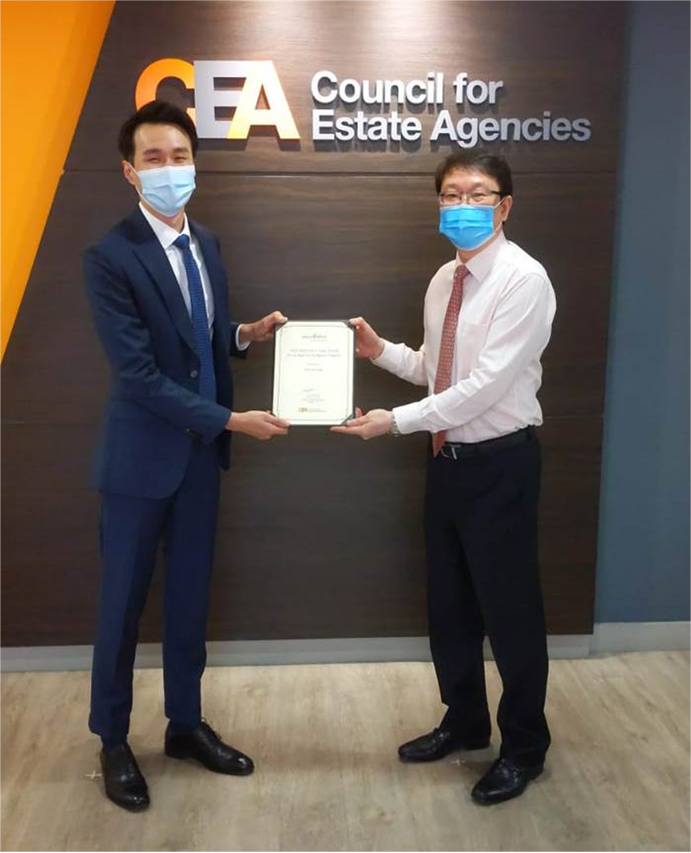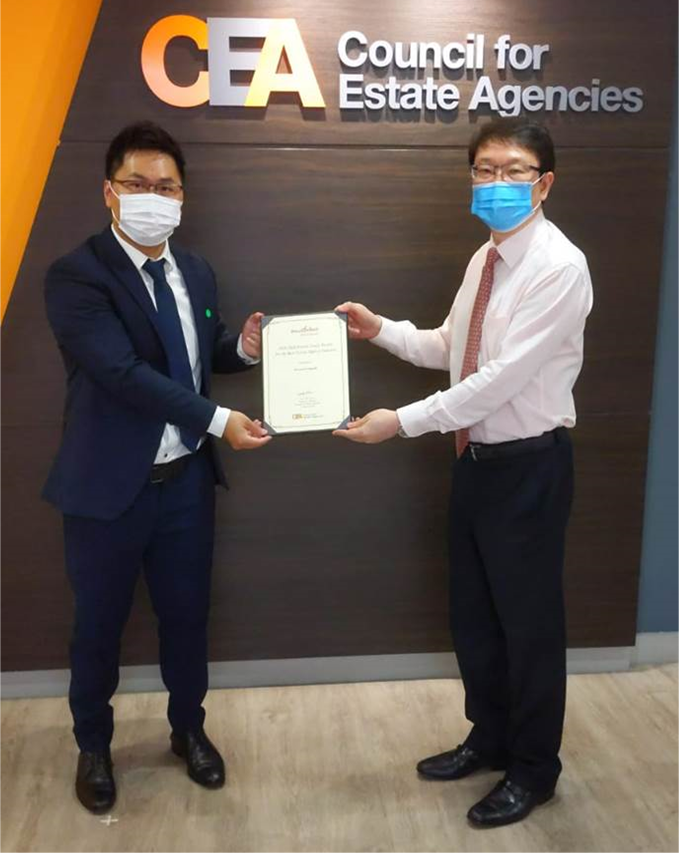Upskilling for the Future with the SkillsFuture Study Award
Mar 2021 - 3 min read
The SkillsFuture Study Award for the Real Estate Agency Industry was introduced in 2019 to encourage Key Executive Officers (KEOs) and salespersons to enrol in courses to acquire relevant skillsets and competencies, stay competitive, and enhance their level of professionalism to provide value-added services to their clients.
Successful applicants receive a monetary award of $5,000 to defray out-of-pocket expenses associated with the course they take, which must be applicable to real estate agency work.
To allow for more KEOs and salespersons to be eligible for the award, CEA revised the eligibility criteria such that salespersons with a minimum of three years’ experience in the industry could apply for the award. This criteria change saw the highest number of applications received since the inaugural award in 2019.
The 2021 SkillsFuture Study Award for the Real Estate Agency Industry was awarded to Chua Yun Cheng from Cushman and Wakefield and Steven He Ling Min from ERA Realty Network on 19 March 2021.
CEAnergy caught up with them to find out more about what motivated their pursuit of further education to enhance their experience in the real estate agency industry.
Chua Yun Cheng, Cushman and Wakefield

Mr Chua Yun Cheng (left) receiving the award from Mr Lim Chee Hwee (right), Executive Director, CEA
A graduate from the National University of Singapore’s (NUS) Real Estate course, Chua Yun Cheng had initially contemplated a degree in business but chose real estate because it was more specialised.
Said Yun Cheng, “Real estate is the largest asset class in the world and also probably the largest financial investment that most people make. Real estate is also an extremely large field with many property types - residential, retail, office, hospitality, logistics, specialised (student hostel, data centres etc). You will probably never find two properties which are the same and that makes the work exciting.”
Yun Cheng joined the real estate agency industry after graduating from NUS, focusing on investment and collective sales. What he found was that while the course modules had prepared him for the technical aspects of working in the industry, the more challenging aspects of the job were the softer facets of working with people and managing relationships.
“Similar to any kind of sales jobs, you will require both the hard and soft skills,” said Yun Cheng. “The hard, technical know-how skills to understand and sell your product well, and the soft skills to navigate the intricate human relations. It can, however, be particularly hard to manage the expectations of homeowners as they, very often, are unable to comprehend what makes a collective sale successful, which explains why so many sites have launched but failed in the last few years.”
In 2019, Yun Cheng decided to upskill himself by pursuing a Master of Science in Applied Finance at the Singapore Management University to complement his current work. He felt that having additional academic credentials would give him a competitive edge.
Upon graduation, he plans on carrying on his focus on investment sales, and he sees his new knowledge base coming in handy with “[drafting] feasibility studies requiring cash flow valuation” as well as providing him with other modelling skills. “Also, having some finance knowledge is beneficial when conversing with high net worth individuals, such as advising them on how having a property asset class would be beneficial for their overall portfolio expected return,” he said.
Asked about what he thought the key skillsets that a salesperson needs to continue to add value to their clients’ property transactions in the face of digitalisation and changing consumer expectations, Yun Cheng said, “Digitalisation brings about greater marketing exposure and opportunities, such as through social media marketing and employing digital tools like virtual tours, videos and drones. It can also help to streamline and reduce paperwork.”
He added, “I perceive adding value as one, getting the highest price for seller and lowest price for buyer, and two, making the transaction as efficient as possible. To accomplish these two goals would only be possible with good people skills, such as a proficiency in negotiation, a robust network, and exemplary knowledge of the local market, asset class and processes. This is especially important for larger value transactions where the clients are not easily swayed by marketing but by actual numbers. Negotiation skills are critical.”
Steven He Ling Min, ERA Realty Network

Mr Steven He Ling Min (left) receiving the award from Mr Lim Chee Hwee (right), Executive Director, CEA
“Give me six hours to chop down a tree, and I will spend the first four sharpening the ax.”
This quote by Abraham Lincoln is Steven He Ling Min’s favourite because it articulates his personal philosophy about constantly upgrading oneself and innovating to stay relevant and competitive. It was this same philosophy that underpinned his decision to pursue a Master of Science in Innovation at the Singapore Management University in 2020.
“It is essential to stay up-to-date with the latest technology tools and industry knowledge to achieve success,” said Steven. “And innovation is the only way to drive your business, maintain a competitive edge and make fantastic breakthroughs. You can’t go wrong with investing in knowledge and education. There will definitely be great returns in the long run.”
With a unique academic cocktail comprising business information technology, building and project management, and now, innovation, Steven aspires to become an entrepreneur who builds a business that connects people and innovatively transforms our society. He views his education background as a boon for his real estate agency work as well.
“Singapore is moving towards digital transformation and becoming a smart city; information technology is the new norm in all industries. Building and project management introduced me to the entire lifecycle of the building, regulations in the industry, the Building & Construction Authority’s vision of green buildings, efficient building technologies to boost industry productivity, and much more. Adding innovation to the mix helps me create solutions for my clients, and puts me in better stead to offer value-added advice to my clients,” Steven explained.
Steven is a firm believer in the importance of innovation, digitalisation and technological savviness to achieve success in the industry. “Real estate consultants need to realise that the consumers are getting more educated and IT savvy; more clients can and prefer to perform their market research and comparisons on their own given the availability of market data. As such, as their real estate consultants, we need to keep up with the latest technological tools and harness our skills and industry knowledge to help save our clients time, create value for them, update them with first-hand information on the latest transactions, and leverage our network to secure a better deal for them,” he said.
He also thinks that there is “tremendous opportunity for digitalisation and innovation in the industry”. Steven explained that more than half of estate agency work is still being carried out offline. “Successful digitalisation could offer process simplification, time savings, improved user experiences for different stakeholders, and relieve the administrative workload,” he said. “Many are aware of this trend, but the complexity requires all stakeholders to work together to integrate this process. Ultimately, it benefits everyone.”
But technology is only one part of the equation. Steven believes that fundamentally, it is critical to “listen to your clients and understand their needs and expectations so that you can work out a good proposal for them. And if you’re passionate about your work, you will build trust and credibility.”
Information accurate as at 23 March 2021